Financial Reporting Regulations and Corporate Governance Analysis
VerifiedAdded on 2023/06/12
|7
|1454
|352
Essay
AI Summary
This essay provides a critical analysis of financial reporting regulation and its close connection to corporate governance, emphasizing the importance of ethical reporting. It discusses how regulatory reporting is guided by International Financial Reporting Standards (IFRS) and Generally Accepted Accounting Principles (GAAP) in the UK, highlighting the role of the Financial Reporting Council (FRC) and various committees in protecting investors. The essay examines the increasing focus on corporate governance and its role in ensuring timely and relevant financial reporting, referencing past accounting scandals such as Tesco, BT Group, Enron, Worldcom and Lehman Brothers to illustrate the consequences of unethical practices. It concludes that corporate governance and ethical reporting are essential for providing a true and fair view of financial statements, promoting responsible financial reporting and protecting investors from fraudulent activities, further enhanced by regulations like the Sarbanes-Oxley Act. Desklib offers a wealth of similar resources to aid student learning.
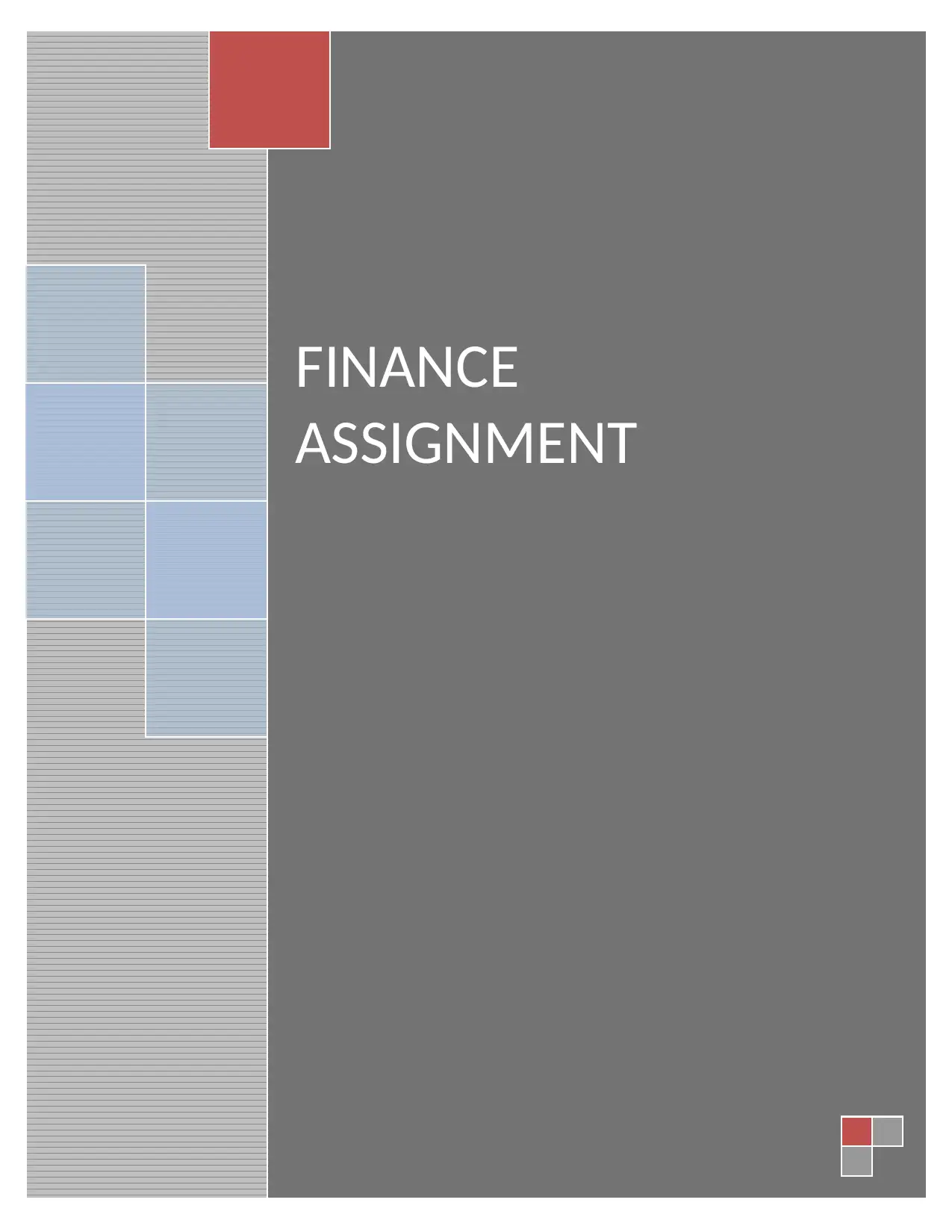
FINANCE
ASSIGNMENT
ASSIGNMENT
Paraphrase This Document
Need a fresh take? Get an instant paraphrase of this document with our AI Paraphraser
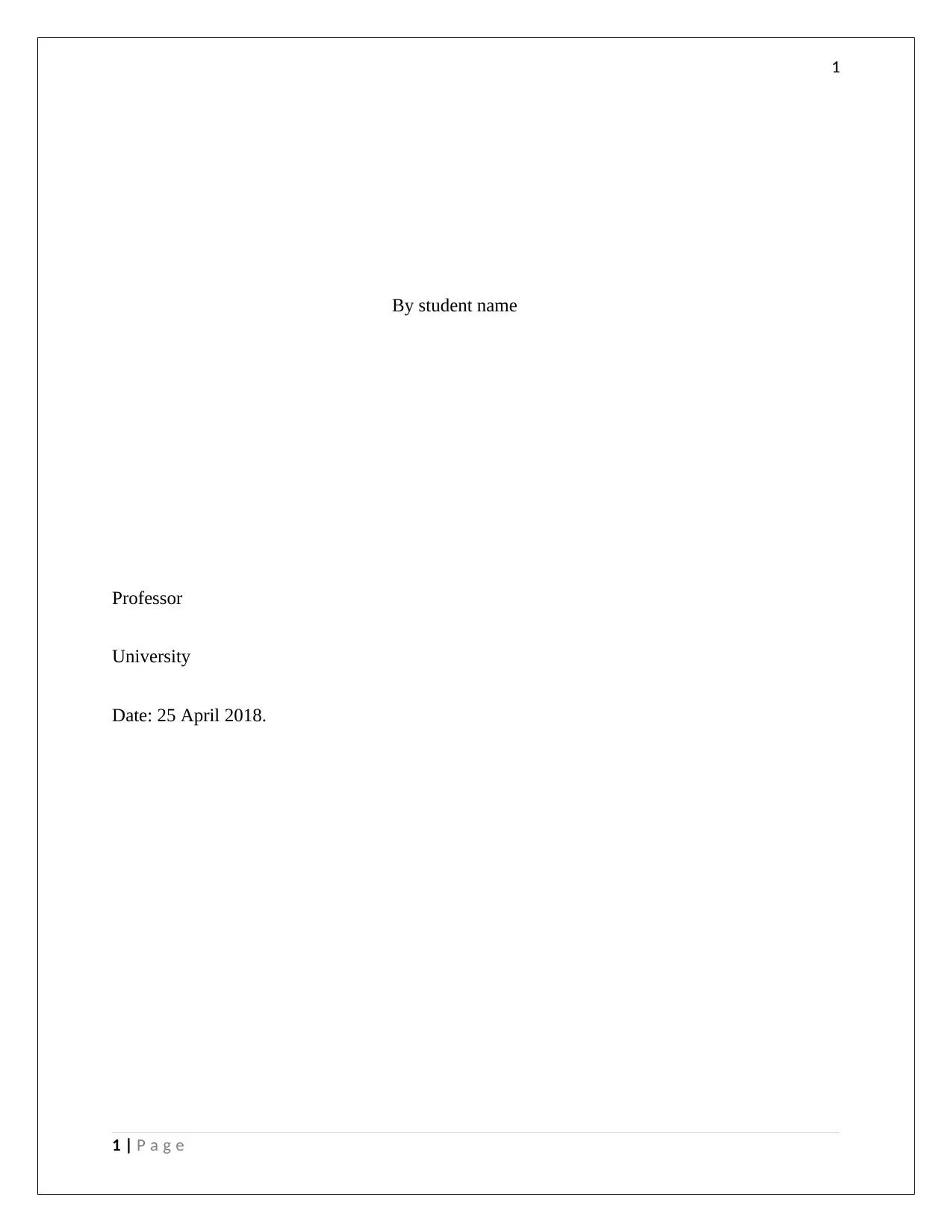
1
By student name
Professor
University
Date: 25 April 2018.
1 | P a g e
By student name
Professor
University
Date: 25 April 2018.
1 | P a g e
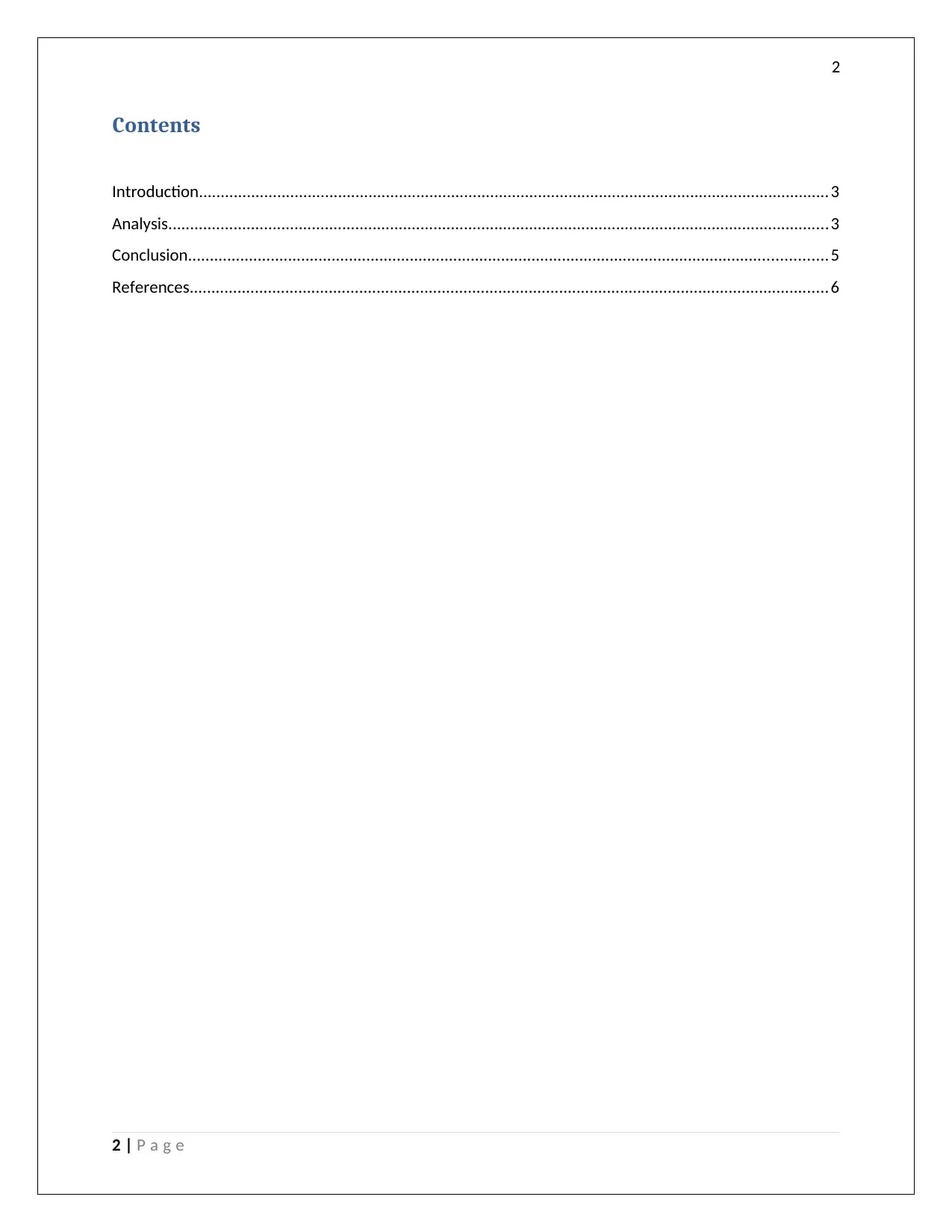
2
Contents
Introduction.................................................................................................................................................3
Analysis........................................................................................................................................................3
Conclusion...................................................................................................................................................5
References...................................................................................................................................................6
2 | P a g e
Contents
Introduction.................................................................................................................................................3
Analysis........................................................................................................................................................3
Conclusion...................................................................................................................................................5
References...................................................................................................................................................6
2 | P a g e
⊘ This is a preview!⊘
Do you want full access?
Subscribe today to unlock all pages.

Trusted by 1+ million students worldwide
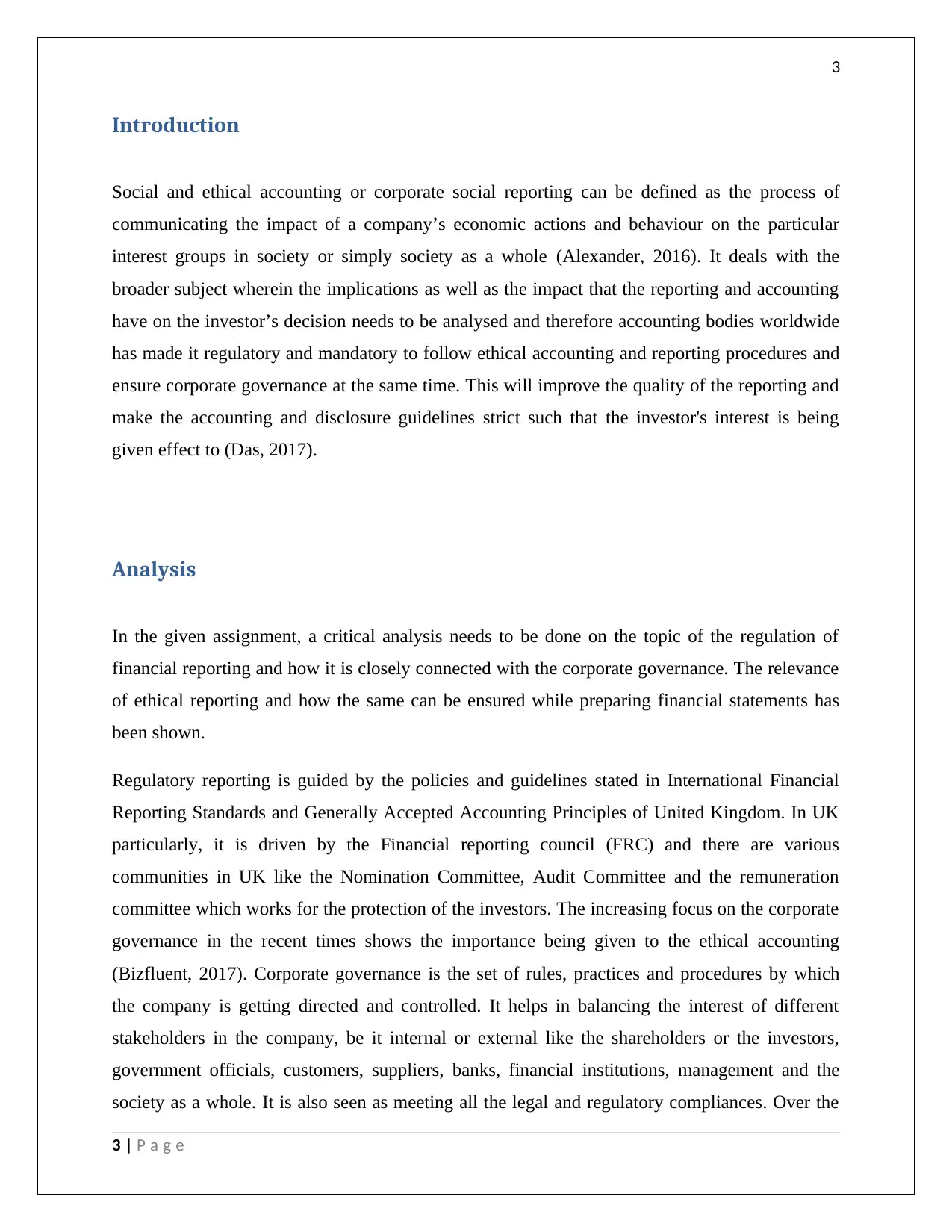
3
Introduction
Social and ethical accounting or corporate social reporting can be defined as the process of
communicating the impact of a company’s economic actions and behaviour on the particular
interest groups in society or simply society as a whole (Alexander, 2016). It deals with the
broader subject wherein the implications as well as the impact that the reporting and accounting
have on the investor’s decision needs to be analysed and therefore accounting bodies worldwide
has made it regulatory and mandatory to follow ethical accounting and reporting procedures and
ensure corporate governance at the same time. This will improve the quality of the reporting and
make the accounting and disclosure guidelines strict such that the investor's interest is being
given effect to (Das, 2017).
Analysis
In the given assignment, a critical analysis needs to be done on the topic of the regulation of
financial reporting and how it is closely connected with the corporate governance. The relevance
of ethical reporting and how the same can be ensured while preparing financial statements has
been shown.
Regulatory reporting is guided by the policies and guidelines stated in International Financial
Reporting Standards and Generally Accepted Accounting Principles of United Kingdom. In UK
particularly, it is driven by the Financial reporting council (FRC) and there are various
communities in UK like the Nomination Committee, Audit Committee and the remuneration
committee which works for the protection of the investors. The increasing focus on the corporate
governance in the recent times shows the importance being given to the ethical accounting
(Bizfluent, 2017). Corporate governance is the set of rules, practices and procedures by which
the company is getting directed and controlled. It helps in balancing the interest of different
stakeholders in the company, be it internal or external like the shareholders or the investors,
government officials, customers, suppliers, banks, financial institutions, management and the
society as a whole. It is also seen as meeting all the legal and regulatory compliances. Over the
3 | P a g e
Introduction
Social and ethical accounting or corporate social reporting can be defined as the process of
communicating the impact of a company’s economic actions and behaviour on the particular
interest groups in society or simply society as a whole (Alexander, 2016). It deals with the
broader subject wherein the implications as well as the impact that the reporting and accounting
have on the investor’s decision needs to be analysed and therefore accounting bodies worldwide
has made it regulatory and mandatory to follow ethical accounting and reporting procedures and
ensure corporate governance at the same time. This will improve the quality of the reporting and
make the accounting and disclosure guidelines strict such that the investor's interest is being
given effect to (Das, 2017).
Analysis
In the given assignment, a critical analysis needs to be done on the topic of the regulation of
financial reporting and how it is closely connected with the corporate governance. The relevance
of ethical reporting and how the same can be ensured while preparing financial statements has
been shown.
Regulatory reporting is guided by the policies and guidelines stated in International Financial
Reporting Standards and Generally Accepted Accounting Principles of United Kingdom. In UK
particularly, it is driven by the Financial reporting council (FRC) and there are various
communities in UK like the Nomination Committee, Audit Committee and the remuneration
committee which works for the protection of the investors. The increasing focus on the corporate
governance in the recent times shows the importance being given to the ethical accounting
(Bizfluent, 2017). Corporate governance is the set of rules, practices and procedures by which
the company is getting directed and controlled. It helps in balancing the interest of different
stakeholders in the company, be it internal or external like the shareholders or the investors,
government officials, customers, suppliers, banks, financial institutions, management and the
society as a whole. It is also seen as meeting all the legal and regulatory compliances. Over the
3 | P a g e
Paraphrase This Document
Need a fresh take? Get an instant paraphrase of this document with our AI Paraphraser
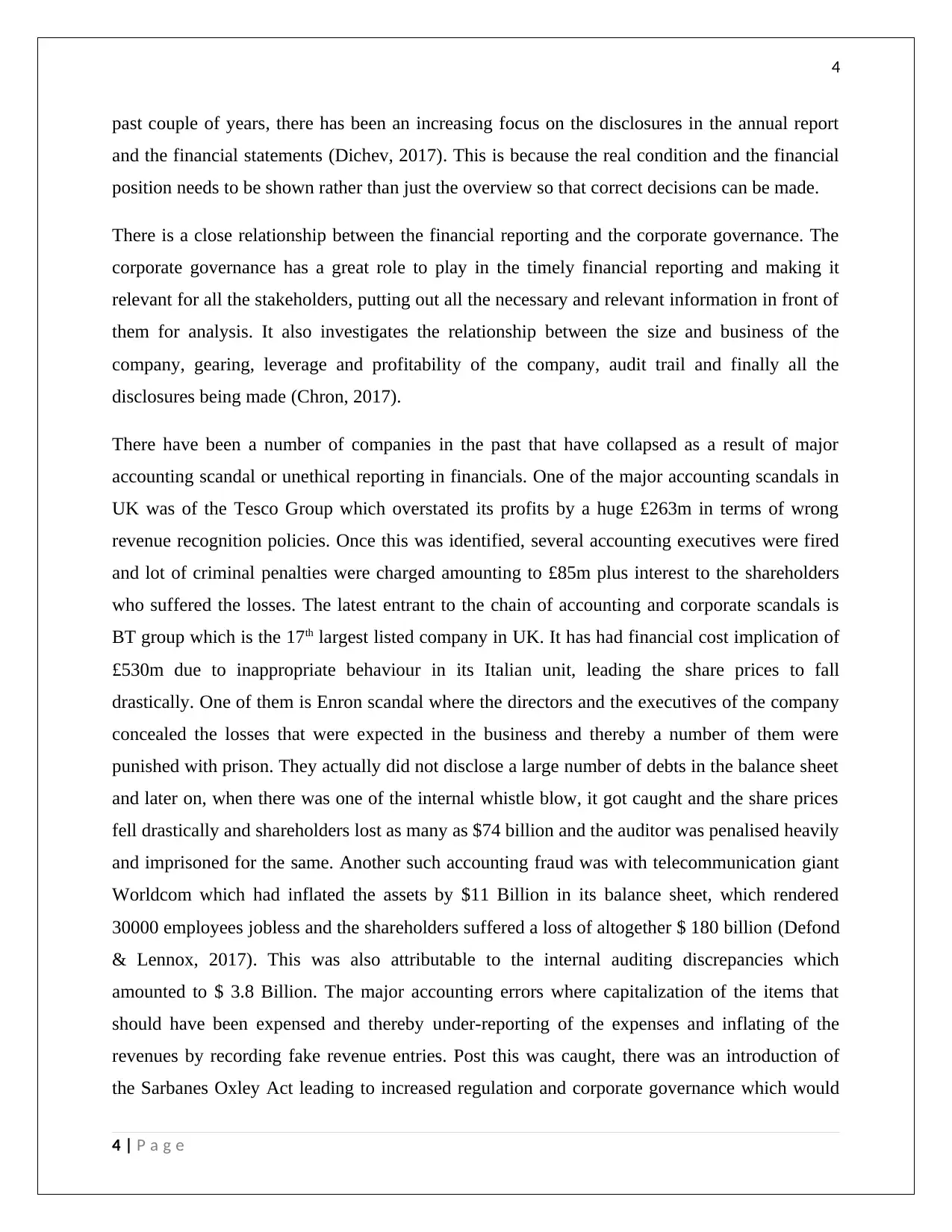
4
past couple of years, there has been an increasing focus on the disclosures in the annual report
and the financial statements (Dichev, 2017). This is because the real condition and the financial
position needs to be shown rather than just the overview so that correct decisions can be made.
There is a close relationship between the financial reporting and the corporate governance. The
corporate governance has a great role to play in the timely financial reporting and making it
relevant for all the stakeholders, putting out all the necessary and relevant information in front of
them for analysis. It also investigates the relationship between the size and business of the
company, gearing, leverage and profitability of the company, audit trail and finally all the
disclosures being made (Chron, 2017).
There have been a number of companies in the past that have collapsed as a result of major
accounting scandal or unethical reporting in financials. One of the major accounting scandals in
UK was of the Tesco Group which overstated its profits by a huge £263m in terms of wrong
revenue recognition policies. Once this was identified, several accounting executives were fired
and lot of criminal penalties were charged amounting to £85m plus interest to the shareholders
who suffered the losses. The latest entrant to the chain of accounting and corporate scandals is
BT group which is the 17th largest listed company in UK. It has had financial cost implication of
£530m due to inappropriate behaviour in its Italian unit, leading the share prices to fall
drastically. One of them is Enron scandal where the directors and the executives of the company
concealed the losses that were expected in the business and thereby a number of them were
punished with prison. They actually did not disclose a large number of debts in the balance sheet
and later on, when there was one of the internal whistle blow, it got caught and the share prices
fell drastically and shareholders lost as many as $74 billion and the auditor was penalised heavily
and imprisoned for the same. Another such accounting fraud was with telecommunication giant
Worldcom which had inflated the assets by $11 Billion in its balance sheet, which rendered
30000 employees jobless and the shareholders suffered a loss of altogether $ 180 billion (Defond
& Lennox, 2017). This was also attributable to the internal auditing discrepancies which
amounted to $ 3.8 Billion. The major accounting errors where capitalization of the items that
should have been expensed and thereby under-reporting of the expenses and inflating of the
revenues by recording fake revenue entries. Post this was caught, there was an introduction of
the Sarbanes Oxley Act leading to increased regulation and corporate governance which would
4 | P a g e
past couple of years, there has been an increasing focus on the disclosures in the annual report
and the financial statements (Dichev, 2017). This is because the real condition and the financial
position needs to be shown rather than just the overview so that correct decisions can be made.
There is a close relationship between the financial reporting and the corporate governance. The
corporate governance has a great role to play in the timely financial reporting and making it
relevant for all the stakeholders, putting out all the necessary and relevant information in front of
them for analysis. It also investigates the relationship between the size and business of the
company, gearing, leverage and profitability of the company, audit trail and finally all the
disclosures being made (Chron, 2017).
There have been a number of companies in the past that have collapsed as a result of major
accounting scandal or unethical reporting in financials. One of the major accounting scandals in
UK was of the Tesco Group which overstated its profits by a huge £263m in terms of wrong
revenue recognition policies. Once this was identified, several accounting executives were fired
and lot of criminal penalties were charged amounting to £85m plus interest to the shareholders
who suffered the losses. The latest entrant to the chain of accounting and corporate scandals is
BT group which is the 17th largest listed company in UK. It has had financial cost implication of
£530m due to inappropriate behaviour in its Italian unit, leading the share prices to fall
drastically. One of them is Enron scandal where the directors and the executives of the company
concealed the losses that were expected in the business and thereby a number of them were
punished with prison. They actually did not disclose a large number of debts in the balance sheet
and later on, when there was one of the internal whistle blow, it got caught and the share prices
fell drastically and shareholders lost as many as $74 billion and the auditor was penalised heavily
and imprisoned for the same. Another such accounting fraud was with telecommunication giant
Worldcom which had inflated the assets by $11 Billion in its balance sheet, which rendered
30000 employees jobless and the shareholders suffered a loss of altogether $ 180 billion (Defond
& Lennox, 2017). This was also attributable to the internal auditing discrepancies which
amounted to $ 3.8 Billion. The major accounting errors where capitalization of the items that
should have been expensed and thereby under-reporting of the expenses and inflating of the
revenues by recording fake revenue entries. Post this was caught, there was an introduction of
the Sarbanes Oxley Act leading to increased regulation and corporate governance which would
4 | P a g e
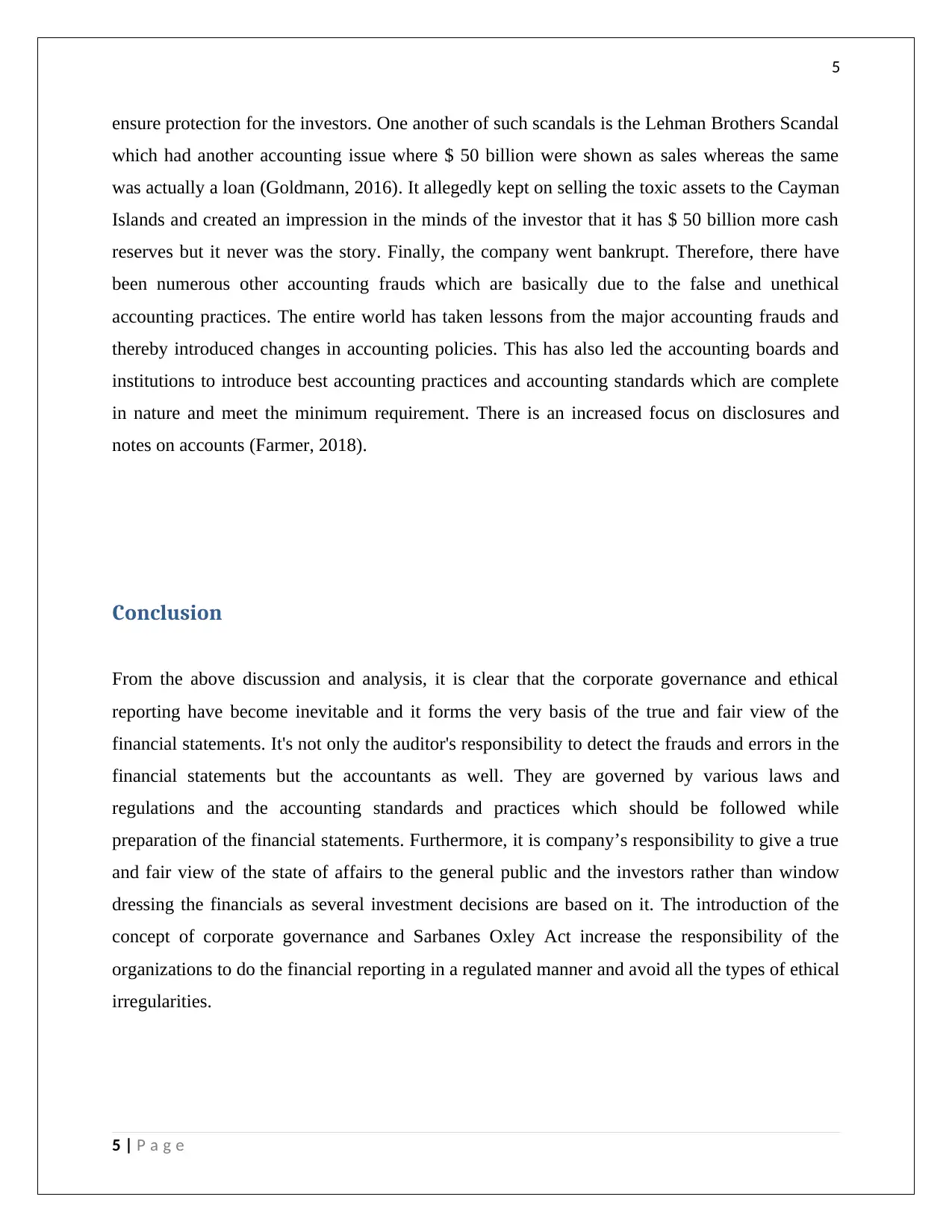
5
ensure protection for the investors. One another of such scandals is the Lehman Brothers Scandal
which had another accounting issue where $ 50 billion were shown as sales whereas the same
was actually a loan (Goldmann, 2016). It allegedly kept on selling the toxic assets to the Cayman
Islands and created an impression in the minds of the investor that it has $ 50 billion more cash
reserves but it never was the story. Finally, the company went bankrupt. Therefore, there have
been numerous other accounting frauds which are basically due to the false and unethical
accounting practices. The entire world has taken lessons from the major accounting frauds and
thereby introduced changes in accounting policies. This has also led the accounting boards and
institutions to introduce best accounting practices and accounting standards which are complete
in nature and meet the minimum requirement. There is an increased focus on disclosures and
notes on accounts (Farmer, 2018).
Conclusion
From the above discussion and analysis, it is clear that the corporate governance and ethical
reporting have become inevitable and it forms the very basis of the true and fair view of the
financial statements. It's not only the auditor's responsibility to detect the frauds and errors in the
financial statements but the accountants as well. They are governed by various laws and
regulations and the accounting standards and practices which should be followed while
preparation of the financial statements. Furthermore, it is company’s responsibility to give a true
and fair view of the state of affairs to the general public and the investors rather than window
dressing the financials as several investment decisions are based on it. The introduction of the
concept of corporate governance and Sarbanes Oxley Act increase the responsibility of the
organizations to do the financial reporting in a regulated manner and avoid all the types of ethical
irregularities.
5 | P a g e
ensure protection for the investors. One another of such scandals is the Lehman Brothers Scandal
which had another accounting issue where $ 50 billion were shown as sales whereas the same
was actually a loan (Goldmann, 2016). It allegedly kept on selling the toxic assets to the Cayman
Islands and created an impression in the minds of the investor that it has $ 50 billion more cash
reserves but it never was the story. Finally, the company went bankrupt. Therefore, there have
been numerous other accounting frauds which are basically due to the false and unethical
accounting practices. The entire world has taken lessons from the major accounting frauds and
thereby introduced changes in accounting policies. This has also led the accounting boards and
institutions to introduce best accounting practices and accounting standards which are complete
in nature and meet the minimum requirement. There is an increased focus on disclosures and
notes on accounts (Farmer, 2018).
Conclusion
From the above discussion and analysis, it is clear that the corporate governance and ethical
reporting have become inevitable and it forms the very basis of the true and fair view of the
financial statements. It's not only the auditor's responsibility to detect the frauds and errors in the
financial statements but the accountants as well. They are governed by various laws and
regulations and the accounting standards and practices which should be followed while
preparation of the financial statements. Furthermore, it is company’s responsibility to give a true
and fair view of the state of affairs to the general public and the investors rather than window
dressing the financials as several investment decisions are based on it. The introduction of the
concept of corporate governance and Sarbanes Oxley Act increase the responsibility of the
organizations to do the financial reporting in a regulated manner and avoid all the types of ethical
irregularities.
5 | P a g e
⊘ This is a preview!⊘
Do you want full access?
Subscribe today to unlock all pages.

Trusted by 1+ million students worldwide
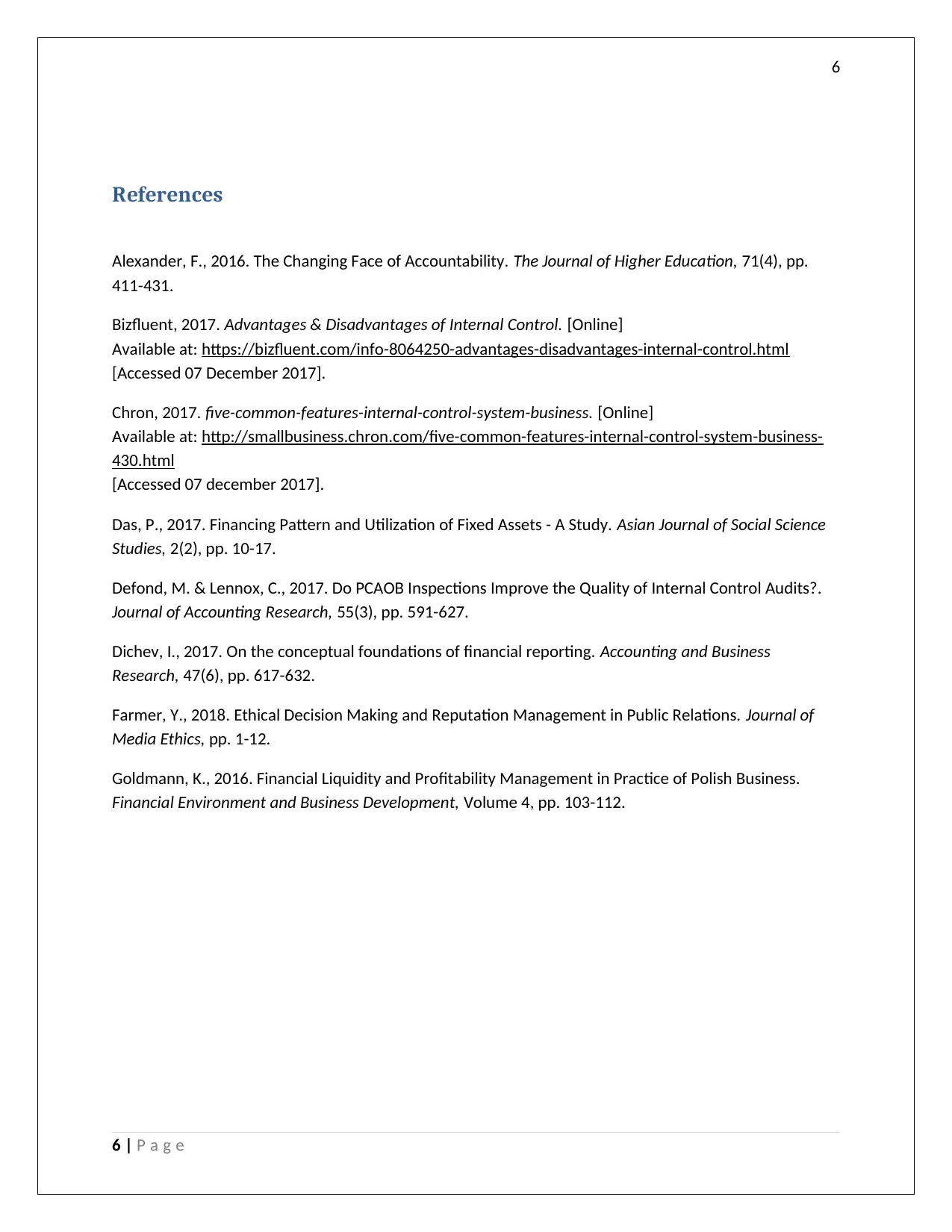
6
References
Alexander, F., 2016. The Changing Face of Accountability. The Journal of Higher Education, 71(4), pp.
411-431.
Bizfluent, 2017. Advantages & Disadvantages of Internal Control. [Online]
Available at: https://bizfluent.com/info-8064250-advantages-disadvantages-internal-control.html
[Accessed 07 December 2017].
Chron, 2017. five-common-features-internal-control-system-business. [Online]
Available at: http://smallbusiness.chron.com/five-common-features-internal-control-system-business-
430.html
[Accessed 07 december 2017].
Das, P., 2017. Financing Pattern and Utilization of Fixed Assets - A Study. Asian Journal of Social Science
Studies, 2(2), pp. 10-17.
Defond, M. & Lennox, C., 2017. Do PCAOB Inspections Improve the Quality of Internal Control Audits?.
Journal of Accounting Research, 55(3), pp. 591-627.
Dichev, I., 2017. On the conceptual foundations of financial reporting. Accounting and Business
Research, 47(6), pp. 617-632.
Farmer, Y., 2018. Ethical Decision Making and Reputation Management in Public Relations. Journal of
Media Ethics, pp. 1-12.
Goldmann, K., 2016. Financial Liquidity and Profitability Management in Practice of Polish Business.
Financial Environment and Business Development, Volume 4, pp. 103-112.
6 | P a g e
References
Alexander, F., 2016. The Changing Face of Accountability. The Journal of Higher Education, 71(4), pp.
411-431.
Bizfluent, 2017. Advantages & Disadvantages of Internal Control. [Online]
Available at: https://bizfluent.com/info-8064250-advantages-disadvantages-internal-control.html
[Accessed 07 December 2017].
Chron, 2017. five-common-features-internal-control-system-business. [Online]
Available at: http://smallbusiness.chron.com/five-common-features-internal-control-system-business-
430.html
[Accessed 07 december 2017].
Das, P., 2017. Financing Pattern and Utilization of Fixed Assets - A Study. Asian Journal of Social Science
Studies, 2(2), pp. 10-17.
Defond, M. & Lennox, C., 2017. Do PCAOB Inspections Improve the Quality of Internal Control Audits?.
Journal of Accounting Research, 55(3), pp. 591-627.
Dichev, I., 2017. On the conceptual foundations of financial reporting. Accounting and Business
Research, 47(6), pp. 617-632.
Farmer, Y., 2018. Ethical Decision Making and Reputation Management in Public Relations. Journal of
Media Ethics, pp. 1-12.
Goldmann, K., 2016. Financial Liquidity and Profitability Management in Practice of Polish Business.
Financial Environment and Business Development, Volume 4, pp. 103-112.
6 | P a g e
1 out of 7
Related Documents
Your All-in-One AI-Powered Toolkit for Academic Success.
+13062052269
info@desklib.com
Available 24*7 on WhatsApp / Email
![[object Object]](/_next/static/media/star-bottom.7253800d.svg)
Unlock your academic potential
Copyright © 2020–2026 A2Z Services. All Rights Reserved. Developed and managed by ZUCOL.





